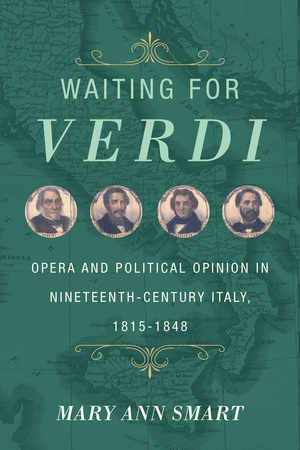Waiting for Verdi: Opera and Political Opinion in Nineteenth-Century Italy, 1815-1848
University of California Press
 Giuseppe Verdi and his oeuvre stands for more than merely operatic excellence, with the trio of La Traviata, Il trovatore and Rigoletto having become some of the most appreciated and timeless creations of the genre.
Giuseppe Verdi and his oeuvre stands for more than merely operatic excellence, with the trio of La Traviata, Il trovatore and Rigoletto having become some of the most appreciated and timeless creations of the genre.
Apart from the mainstream appeal, Verdi’s operas had more often than not a prominent political tinge with the reunification of Italy being a recurring theme, resulting in the dilemma that his artistic output cannot really be separated from his political convictions.
With Waiting for Verdi Mary Ann Smart examines the context an impact of Verdi’s operas and their theatrical incarnations along with the reactions and controversies they spurned, not only when It came to evoking intense feelings but by inspiring Italians to believe in the DNA and strength of Italian traits and how their faith and actions could catapult Italy to the forefront of European countries through political change.
By meticulously analysing how Verdi structured his operas via employing canto forms and a wide range of innovative variations to achieve result oriented performances, Mary Ann Smart leads the attentive listener down a rabbit hole on a journey that assists in both illuminating facets and gaining fresh and stimulating perspectives on Italian opera and music at large.
After reading Waiting for Verdi and following Smart’s cultural and aesthetical analysis, I revisited his catalogue and found a new appreciation for how passionate Verdi was in weaving his devotion to Italy, romanticism and political convictions into each note and felt how as a musical vehicle must have helped shape Italy as a nation in the second half of the nineteenth century.